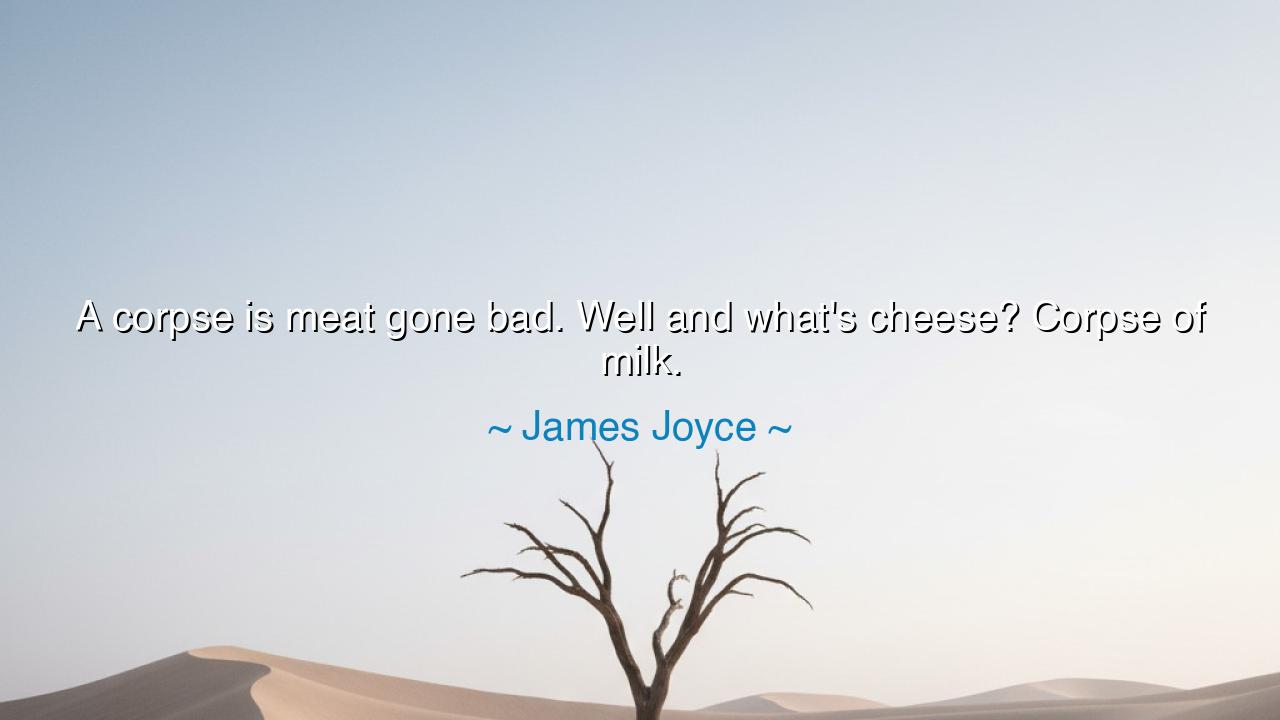
A corpse is meat gone bad. Well and what's cheese? Corpse of






Opening Scene
The room is dimly lit, the soft glow of the overhead light casting a warm, intimate atmosphere. Outside, the city is quiet, with only the distant sounds of traffic. Jack is sitting at the table, sipping a cup of coffee, looking at a book in front of him, though his mind seems elsewhere. Jeeny stands by the window, gazing out at the city, her arms loosely crossed. There’s a quiet tension between them, as if the words spoken next will open a deeper conversation.
Host: After a long pause, Jeeny turns, her voice breaking the stillness as she speaks softly but thoughtfully.
Jeeny: “I came across a quote from James Joyce the other day, and it really stuck with me. He said, ‘A corpse is meat gone bad. Well and what’s cheese? Corpse of milk.’ It’s such a strange and vivid way to look at food, isn’t it? It’s both unsettling and fascinating. I mean, he’s making us think about what we eat, how we relate to food, and how we categorize things.”
Jack: “It’s so blunt, yet oddly poetic. Joyce has this ability to transform the ordinary into something thought-provoking. He’s not just talking about food, he’s making us question our understanding of life and death, even in the simplest things. A corpse is just meat that’s decayed, right? But then, to call cheese the ‘corpse of milk’... it turns something as mundane as cheese into something more unsettling, something that requires us to reconsider our relationship with food and life itself.”
Jeeny: “Right. It’s almost like he’s showing the paradox of life and death in the most everyday things. When you think about it, cheese is something we enjoy, something that’s associated with comfort and indulgence. But Joyce’s metaphor forces us to look at it in a completely different light — something that’s no longer fresh, that’s passed through a process of decay. It’s making us see the food we take for granted as part of this ongoing cycle of transformation.”
Jack: “It’s interesting, too, how Joyce is flipping the narrative. Normally, when we think of decay, we think of death, the end of life. But he’s reminding us that decay can also be part of a process of renewal. Cheese, though it comes from decayed milk, becomes something new, something people love. It’s not just a story of death; it’s a story of how things change, evolve, and transform.”
Host: The conversation begins to deepen, as though Joyce’s words have sparked a realization about the life cycle of food. Jeeny walks over to the table, her voice steady as she continues.
Jeeny: “So maybe that’s the point, right? Nothing is purely one thing. Food, like life, is full of contradictions. Something that’s technically the ‘corpse’ of something else — like cheese being the corpse of milk — can still be something that we cherish and enjoy. It’s this constant cycle of life, death, and transformation that we can’t really escape. Everything, in a way, is constantly becoming something new.”
Jack: “Exactly. And maybe Joyce is asking us to stop seeing things in such binary terms. Life or death. Fresh or decayed. Instead, he’s showing us that these transitions are part of a much larger continuum. Life and death are not opposites; they’re intertwined, and the same goes for food. Cheese isn’t just the decay of milk — it’s a rebirth. A transformation into something that has its own purpose and value.”
Jeeny: “It makes you rethink everything we take for granted — the things we eat, the way we process food, and how we view our own lives. We’re all in this constant process of becoming, just like the milk becoming cheese. It’s not about what something was, but what it becomes. And that’s a reminder to see the value in what’s changed, even if it comes from something that was once seen as ‘bad’ or ‘decayed.’”
Jack: “That’s a really beautiful way to think about it. Everything we consume, everything we experience, is part of a larger process. Nothing stays static. What we perceive as decay or death is just the beginning of something else, something that may eventually hold a new meaning or purpose. It’s a cycle of growth, change, and renewal.”
Host: The conversation quiets as they both reflect on the complexity of Joyce’s metaphor. The world outside continues its rhythm, but inside, Jack and Jeeny share an understanding that food, life, and even decay are not as simple as they seem. Transformation is at the heart of everything — from the food we eat to the lives we lead. And sometimes, it’s through decay that new things are born.
Jeeny: “So maybe the lesson here is to stop fearing the decay or the endings, and instead, see them as part of a larger process of growth and transformation. What seems like an end could be the beginning of something new.”
Jack: “Exactly. It’s all part of the flow of life. Life, death, decay, and rebirth — it’s a reminder that everything is connected and that nothing is permanent. Even in what seems like an end, there’s always the potential for something beautiful to emerge.”
Host: As the conversation winds down, the room feels full of understanding. Joyce’s unsettling metaphor reminds them that life, death, and transformation are inseparable, and that what we perceive as decay can also be the beginning of something new. In food, in life, and in all things, there is beauty in change, in decay, and in what comes next.






AAdministratorAdministrator
Welcome, honored guests. Please leave a comment, we will respond soon